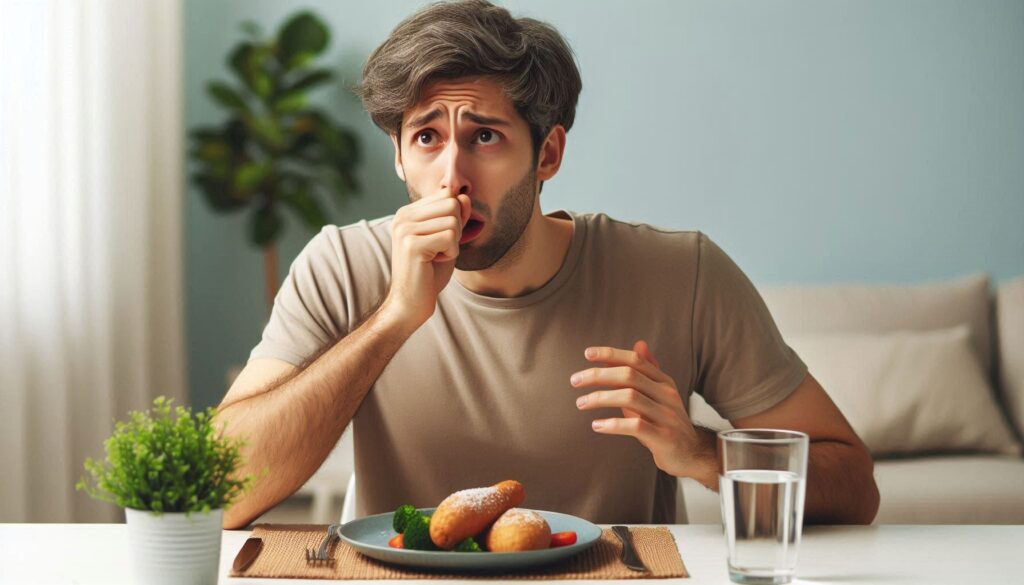Sneezing After Eating: What It Means and How to Manage It
Table of Contents:
- Introduction
- Why Do Some People Sneeze After Eating?
- Common Triggers for Sneezing After Meals
- Is Sneezing After Eating a Medical Concern?
- How to Manage Sneezing After Eating
- 1. Identifying Your Triggers
- 2. Dietary Modifications
- 3. Medication and Treatment Options
- 4. Lifestyle Adjustments
- When to Seek Medical Help
- Conclusion
Introduction
Have you ever noticed an unexpected sneeze or sneezing fit after finishing a meal? You’re not alone. Sneezing after eating is a phenomenon that affects many people and can be puzzling, especially when it happens frequently. While it’s usually not a cause for concern, it’s worth understanding the potential causes and ways to manage it. This article dives into the reasons behind sneezing after eating and offers practical solutions to reduce or eliminate the occurrence.
Why Do Some People Sneeze After Eating?
Sneezing after eating is often related to a reflex known as gustatory rhinitis, which occurs when certain foods or eating habits trigger your body to react. Unlike typical allergies, gustatory rhinitis doesn’t involve the immune system. Instead, it’s caused by nerve stimulation, particularly in response to spicy or hot foods. This stimulation can lead to sneezing, a runny nose, or nasal congestion shortly after meals.
Other Possible Causes:
- Photic sneeze reflex: A genetic condition where bright light exposure triggers sneezing, which can be exacerbated after eating.
- Food allergies or sensitivities: In some cases, sneezing might be triggered by an allergic reaction to specific foods.
- Temperature change: Eating hot or cold food could irritate nasal passages and lead to sneezing.
Common Triggers for Sneezing After Meals
Several factors can cause sneezing after eating, including specific foods, environmental conditions, or bodily responses:
- Spicy foods – Foods with capsaicin, like hot peppers, can overstimulate nerves.
- Alcohol consumption – Alcohol can dilate blood vessels, causing nasal congestion and sneezing.
- Strong-smelling foods – Aromatic dishes might irritate the nasal lining.
- Cold foods – Cold desserts like ice cream can cause nerve irritation, especially in sensitive individuals.
- Seasonal allergies – If you already have allergies, consuming certain foods can intensify symptoms.
Is Sneezing After Eating a Medical Concern?
For most people, sneezing after eating is a benign and temporary issue. However, persistent sneezing, coupled with other symptoms like nasal congestion or throat irritation, might indicate an underlying condition, such as non-allergic rhinitis or even food allergies. It’s essential to differentiate between an occasional harmless sneeze and a more chronic condition that may require medical intervention.

How to Manage Sneezing After Eating
1. Identifying Your Triggers
The first step in managing post-meal sneezing is pinpointing the foods or conditions that trigger your symptoms. Try keeping a food journal to record what you eat and when you sneeze. This can help identify patterns and specific triggers.
2. Dietary Modifications
Once you’ve identified the foods or drinks that trigger sneezing, reduce or eliminate them from your diet. Common adjustments include:
- Avoiding spicy or heavily seasoned foods.
- Reducing the consumption of dairy or cold foods, which might cause irritation.
- Drinking warm water instead of cold beverages during meals.
3. Medication and Treatment Options
For those with frequent symptoms, certain medications or treatments may be helpful:
- Over-the-counter nasal sprays: These can help reduce inflammation and prevent sneezing.
- Antihistamines: Even though gustatory rhinitis isn’t caused by allergies, some people find antihistamines helpful in controlling sneezing.
- Nasal decongestants: These may provide relief from nasal congestion that accompanies sneezing.
4. Lifestyle Adjustments
Making small lifestyle changes can also help in reducing sneezing episodes after meals:
- Eating slowly: Rushing through meals may increase the chances of triggering a sneeze reflex.
- Breathing through the nose while eating: This reduces nasal irritation caused by mouth breathing.
- Maintaining a consistent meal temperature: Eating foods that are not too hot or cold may help avoid nerve stimulation in the nasal passages.
When to Seek Medical Help
If sneezing after eating is frequent, severe, or associated with other concerning symptoms such as difficulty breathing, swelling, or persistent nasal congestion, it’s important to consult a healthcare provider. They may recommend an evaluation for food allergies or other medical conditions like rhinitis or sinusitis.
Conclusion
Sneezing after eating is a common but often harmless phenomenon. Understanding its causes, like gustatory rhinitis or food sensitivities, and managing your diet and environment can significantly reduce symptoms. While it’s usually not a cause for concern, consulting a doctor is advisable if the sneezing becomes persistent or affects your quality of life.
By being mindful of your triggers and making a few dietary and lifestyle changes, you can enjoy your meals without the surprise of an after-meal sneeze!

FAQs:
LINKS:
Know more about urine color chart – https://www.healthline.com/health/urine-color-chart
Do you want to know Tea vs Coffee – https://articlesmatrix.com/tea-vs-coffee-the-ultimate-showdown/
Know about The Hidden Dangers in Your Everyday Food – https://articlesmatrix.com/the-hidden-dangers-in-your-everyday-food-what-you-need-to-know/
summaries, summaries, summaries, summaries, summaries, summaries, summaries, summaries, summaries, summaries, summaries
You really need to know about This ancient remedy – https://articlesmatrix.com/forget-chemo-this-ancient-remedy/
Know about shilajit – https://articlesmatrix.com/unlocking-the-secrets-of-longevity/
Mindfulness – https://articlesmatrix.com/the-shocking-truth-about-mindfulness-they-dont-want-you-to/
Know about circadian rhythm – https://articlesmatrix.com/understanding-the-role-of-circadian-rhythms-in-overall-health/
Do you know about Quantum Computers – https://articlesmatrix.com/quantum-computings-futuristic-promise-exploring-the-secrets-of-the-universe/
know about DARQ – https://articlesmatrix.com/10-mind-blowing-ways-dlt-and-ai-are-reshaping-our-digital-reality/
Know about Extended Reality and Distributed Ledgers – https://articlesmatrix.com/extended-reality-meets-distributed-ledgers-a-glimpse-into-the-future-of-immersive-tech/

